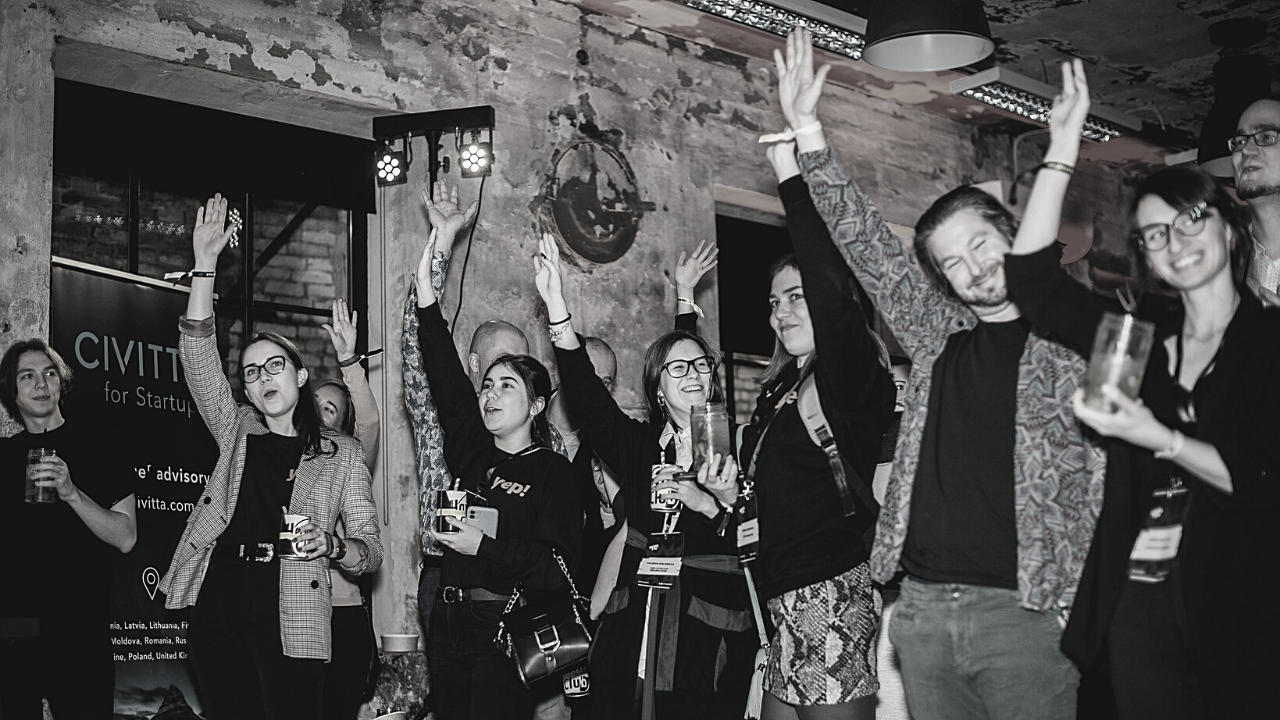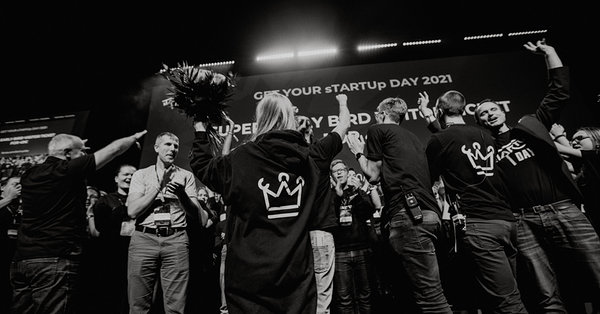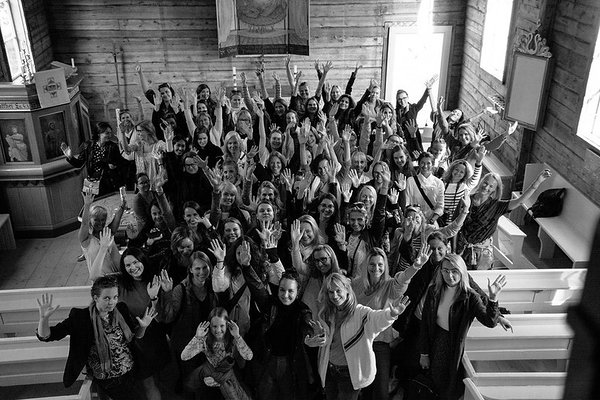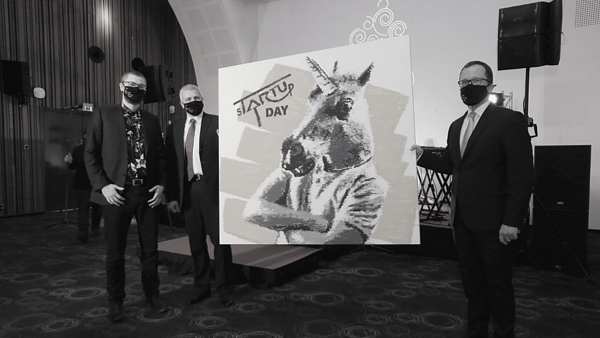
Wrapping up the startup year 2020
This year has been unpredictable, challenging, and demanding for all of us. You could even say that the everyday life of almost all people started to resemble life in a startup. There is a lot of uncertainty, the line between work and family life is blurry, and you have to be ready to pivot at any minute.
For startups, this rhythm is the normality! That's why it's no surprise that something successful and exciting happened every month of the year in the startup world: from cool community events and shiny awards to mind-blowing investments and new awesome startups. Let's take a look at this year's highlights!
At the end of January, the fourth sTARTUp Day took place. And as always, records were broken! We had 4,400 visitors and 158 performers from 60 countries around the world visiting Tartu. During the festival, startups, investors, and executives booked 2491 meetings to make new connections.
In the first half of the month, the number of startups registered in Estonia exceeded the magical 1,000! According to the Startup Estonia database, most startups are operating in business software and HR (191) and in FinTech (144).
Estonian startup Pactum, developing artificial intelligence for negotiations, started cooperating with Walmart, the largest US retail chain, to develop their global supplier platform. As the company has many contracts with suppliers, using artificial intelligence allows them to save money and speed up the process.
The crisis did not prevent the startups from raising money either. The telemedicine company Viveo Health raised 2 million euros to provide medical care via a video bridge and prevent the spread of the coronavirus in the hospital waiting room.
Bolt raised 100 million euros to expand its ride-hailing, food delivery, and scooter rental business. With the investment, the value of the unicorn increased to 1.7 billion.
The Female Founders Meetup, a series of events created by the Estonian Founders' Society and sTARTUp Day, was launched on June 17, aiming to create a community of women entrepreneurs to discuss issues and support each other. At the first event, Kaidi Ruusalepp, Genia Trofimova, and Ann Runnel talked about their experience of founding a company.
Estonian startups and entrepreneurs received recognition at The Europas Awards. Bolt was named the hottest European unicorn of the year, and Taavet Hinrikus, the co-founder of TransferWise, was declared the pathfounder of the year.
Woola was declared the best green tech startup in Estonia as well as in Europe. Woola makes wool bubble wrap and envelopes out of leftover sheep wool! And they recently raised 450,000€ to scale their product and expand to international markets.
September was also a month of raising money. Cachet, an insurance startup, raised 1.1 million euros for expansion, and Outfunnel, a startup founded by former Pipedrive employees, also received an investment of 1.1 million euros. At the end of the month, the software company Klaus announced that they raised 4.6 million euros.
Also, a new investment group, .Cocoon Ventures, was founded by Aleksander Tõnnisson, Rein Lemberpuu, and Rain Kivisik. The group supports founders who are interested in self-hacking and looking at entrepreneurship as a way for self-development.
Startup marketing podcast grit. joined to the Estonian podcast landscape. The podcast aims to share the best marketing tips and latest trends by talking with the brightest marketers from startups. The podcast is hosted by Andreas Unt and Marelle Ellen, who both are CMOs themselves.
The representatives of the European Parliament and the founders and CEOs of Tartu startups gathered at SPARK Demo to talk about the progress of the digital transition in Europe and to discuss effective cooperation opportunities between Estonia and Europe.
Skeleton Technologies raised 41.3 million euros of equity capital from investors, which is among the top five funding rounds for the cleantech sector in the EU this year.
At the end of the month, Remato, a construction software startup, was named the most outstanding startup in Tartu. Founded in 2018, Remato has more than 150 customers in Estonia and Finland. The company has raised 630,000 euros. We had a chat with Madis Lehtmets, the CEO and co-founder of Remato, about his entrepreneurial journey and the company's future plans.
The Apolitical and World Economic Forum announced the world’s 50 most influential people revolutionizing governance. Among them is Mikk Vainik, the head of the Estonian innovation program Accelerate Estonia.
Looking back at all of these amazing achievements, the year doesn't look so bad. If the startup sector could accomplish so much during this hectic year, wonder what the new year will bring. Lots of success stories, cool challenges, and surprises for sure!
January
The Estonian Startup Awards kicked off the year. The community highlighted the most influential startups and the most impactful contributors of the startup sector in nine categories. CoModule even received two awards – the fastest turnover growth and the hardware company of the year. Check out all the winners and mark your calendars for this year's gala!At the end of January, the fourth sTARTUp Day took place. And as always, records were broken! We had 4,400 visitors and 158 performers from 60 countries around the world visiting Tartu. During the festival, startups, investors, and executives booked 2491 meetings to make new connections.
Author: Kiur Kaasik
February
February marked the launch of foundMe – a media platform providing startups a common information space and a channel to share experiences and opinions on community and the startup scene. And the best thing is that you can read our articles and interviews in Estonian, as foundMe is our official media partner.In the first half of the month, the number of startups registered in Estonia exceeded the magical 1,000! According to the Startup Estonia database, most startups are operating in business software and HR (191) and in FinTech (144).
March
Immediately after the state of emergency was declared in Estonia, Garage48 and Accelerate Estonia organized an online hackathon, “Hack the Crisis”, to provide solutions on how to use technology for crisis response and how to cope in the post-crisis era. The idea of the hack soon spread all around the world, leading to a Global Hack involving more than 12,000 people in 100 countries. In addition, many country-specific hackathons took place during the spring to find solutions to the damage caused by the corona crisis.Estonian startup Pactum, developing artificial intelligence for negotiations, started cooperating with Walmart, the largest US retail chain, to develop their global supplier platform. As the company has many contracts with suppliers, using artificial intelligence allows them to save money and speed up the process.
The crisis did not prevent the startups from raising money either. The telemedicine company Viveo Health raised 2 million euros to provide medical care via a video bridge and prevent the spread of the coronavirus in the hospital waiting room.
April
In April, the EU-Startups, bringing together European startups, announced the 50 most influential female entrepreneurs in Europe. Three Estonian women entrepreneurs were also among them: Maarika Truu, former head of Startup Estonia, Kaidi Ruusalepp, CEO of Funderbeam, and Karoli Hindriks, CEO of Jobbatical.May
Restrictions caused by the coronavirus disrupted the work of many companies, but that's where pivoting comes into play. One good example is MySpotit, a startup that previously rented out office space. But when the crisis hit, they developed an office sharing platform to support the return to work after isolation. They opened their first room in early December in Noblessner.Bolt raised 100 million euros to expand its ride-hailing, food delivery, and scooter rental business. With the investment, the value of the unicorn increased to 1.7 billion.
June
In June, a huge exit took place. The Estonian mobile payments startup Fortumo was acquired by the London Stock Exchange-listed mobile payments platform Boku for almost 40 million euros. Fortumo continues to operate as an independent entity in the Boku Group with the same management and team.The Female Founders Meetup, a series of events created by the Estonian Founders' Society and sTARTUp Day, was launched on June 17, aiming to create a community of women entrepreneurs to discuss issues and support each other. At the first event, Kaidi Ruusalepp, Genia Trofimova, and Ann Runnel talked about their experience of founding a company.
Author: Sigrid Mölder
The Estonian parliament approved amendments to the digital nomad visa. Estonia is one of the first countries in the world to offer it.Estonian startups and entrepreneurs received recognition at The Europas Awards. Bolt was named the hottest European unicorn of the year, and Taavet Hinrikus, the co-founder of TransferWise, was declared the pathfounder of the year.
Woola was declared the best green tech startup in Estonia as well as in Europe. Woola makes wool bubble wrap and envelopes out of leftover sheep wool! And they recently raised 450,000€ to scale their product and expand to international markets.
July
In July, the US investment fund D1 Capital Partners paid approximately $200 million for a 4 percent stake in TransferWise. As a result, the company's value increased to $5 billion.August
Despite the confusing times and uncertain conditions, startups flourished in the first half of the year regarding the number of employees, investments, and turnover. The Startup Estonia statistics revealed that in the first half of 2020, Estonian startups generated 364.5 million euros in turnover – 40% more compared to the same period in 2019.September
In mid-September, Eve Peeterson started as the new head of Startup Estonia. Before that, she was the CEO of the event marketing agency Orangetime Event.September was also a month of raising money. Cachet, an insurance startup, raised 1.1 million euros for expansion, and Outfunnel, a startup founded by former Pipedrive employees, also received an investment of 1.1 million euros. At the end of the month, the software company Klaus announced that they raised 4.6 million euros.
Also, a new investment group, .Cocoon Ventures, was founded by Aleksander Tõnnisson, Rein Lemberpuu, and Rain Kivisik. The group supports founders who are interested in self-hacking and looking at entrepreneurship as a way for self-development.
October
At the beginning of October, Jaan Hendrik Murumets, the CEO and one of the owners of the IoT company Krakul, was awarded the title of Young Entrepreneur of the Year. Krakul has created solutions for more than a hundred global projects, including Starship's delivery robots and Bikeep's smart bike racks.Startup marketing podcast grit. joined to the Estonian podcast landscape. The podcast aims to share the best marketing tips and latest trends by talking with the brightest marketers from startups. The podcast is hosted by Andreas Unt and Marelle Ellen, who both are CMOs themselves.
November
In November, Pipedrive made history and became the fifth unicorn in Estonia! The investment from the US fund Vista Equity Partners increased the company's value to $1.5 billion. Today, Pipedrive is used by sales teams at more than 90,000 companies worldwide in more than 150 countries.The representatives of the European Parliament and the founders and CEOs of Tartu startups gathered at SPARK Demo to talk about the progress of the digital transition in Europe and to discuss effective cooperation opportunities between Estonia and Europe.
Skeleton Technologies raised 41.3 million euros of equity capital from investors, which is among the top five funding rounds for the cleantech sector in the EU this year.
At the end of the month, Remato, a construction software startup, was named the most outstanding startup in Tartu. Founded in 2018, Remato has more than 150 customers in Estonia and Finland. The company has raised 630,000 euros. We had a chat with Madis Lehtmets, the CEO and co-founder of Remato, about his entrepreneurial journey and the company's future plans.
Author: Margus Ansu
December
In December, it became clear that Lauri Haav, who has more than 20 years of experience in the field of IT and financial technology, will lead the development and implementation of the strategy for the next wave of the joint e-residency program of Estonian state agencies.The Apolitical and World Economic Forum announced the world’s 50 most influential people revolutionizing governance. Among them is Mikk Vainik, the head of the Estonian innovation program Accelerate Estonia.
Looking back at all of these amazing achievements, the year doesn't look so bad. If the startup sector could accomplish so much during this hectic year, wonder what the new year will bring. Lots of success stories, cool challenges, and surprises for sure!
Articles you might also like:

How to Conquer the Everest of (Social) Media? Lessons from Tartu 2024
13.03.2025
On January 30, at sTARTUp Day 2025, an engaging seminar titled "How to Conquer the Everest of (Social) Media" brought together experts...

Interview with Vaido Mikheim, Head of Startup Estonia: The State and Future of Estonia’s Startup Ecosystem
05.02.2025
Estonia’s startup ecosystem has gained international recognition for its high number of unicorns per capita and its strong community spirit. As the...


